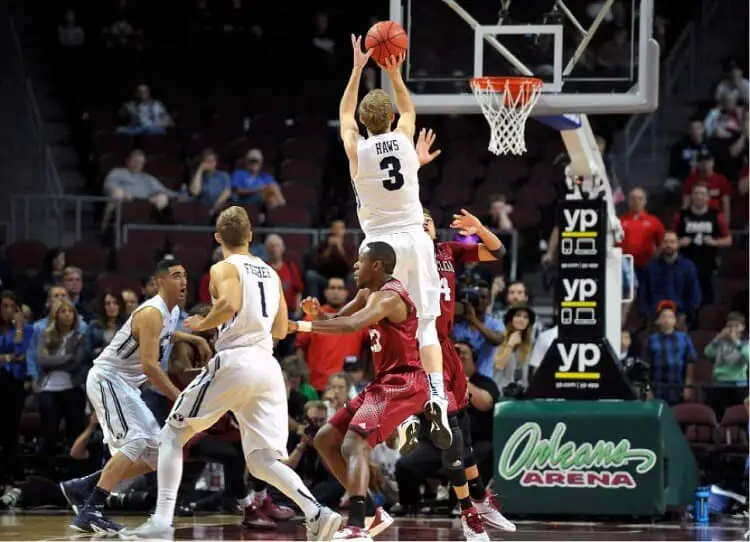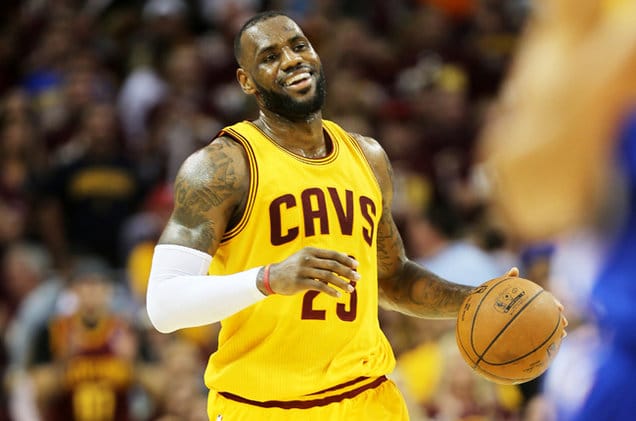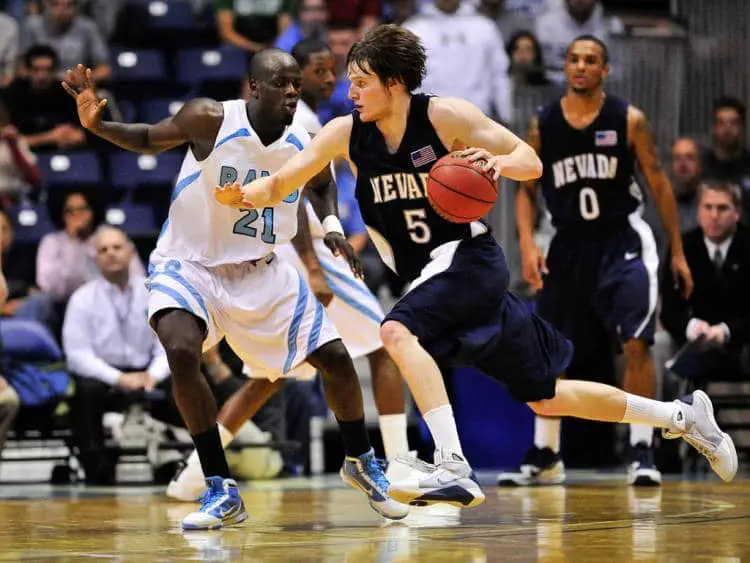Table of Contents
Have you ever considered the importance of basketball motivation? Winning in basketball is not just about skill and strategy. Part of it is a mental game. The importance of mental aspects in sports is acknowledged and researched in sports psychology. Maintaining a healthy level of motivation has shown to be helpful in winning consistently.
A loss that isn’t handled well can usually lead a team into low periods in which they lack motivation and continue losing. Sufficient knowledge and implementation of motivational techniques can prevent this from happening. Continue reading to learn more about basketball motivation, how to avoid taking motivation too far, and tips for maintaining a healthy level of motivation.

*This post may contain affiliate links. As an Amazon Associate we earn from qualifying purchases.
What Is Basketball Motivation?
Basketball motivation is the drive to reach goals or outcomes in basketball. Lack of motivation will contribute to a losing team continuing to lose. Basketball motivation, however, can turn it around. Michigan’s men’s basketball team in the NCAA is a good example of this in action. They had a 1-6 record, a 13 loss streak against the Spartans, and dejected fans.
Through basketball motivation, the Wolverines were able to win 8 of 11 regular season games, tie for fourth in the Big Ten, and land as #8 seed in the NCAA tournament.
According to Jeff Janssen of the Michigan Leadership Academy, “The coaches were upbeat and positive while the players were enthusiastically giving their all in drills. There was a lot of positive communication going on and an intensity that belied the lopsided conference win-loss record.”
Signs of Basketball Motivation Gone Wrong
While well-intentioned, some people take basketball motivation too far. When implemented incorrectly, harm will be caused to the players. Both coaches and athletes must be aware of how to correctly motivate. One sign of basketball motivation gone wrong is fearful players. Using fear to motivate players isn’t a good tactic to use. It decreases an individual’s motivation.
As explained on Sport Psychology Today, “Fear doesn’t enhance an athlete’s sports experience. And it’s not good motivators–although some coaches try to rely on it. Fear is a mental game killer.”
Examples of behaviors and attitudes that decrease motivation in sports are:
- Poor communication.
- Telling athletes what to improve but not how to improve.
- Only focusing on what’s wrong.
- Lack of a team vision.
- Failing to live by the team’s core values.
- Punishing failure.
- Avoiding risk.
- Failing to acknowledge efforts and accomplishments.
4 Tips for Maintaining Balance in Basketball Motivation

1. Establish Core Values for the Team
One of the methods that the Wolverines used to correctly motivate themselves was embracing team core values. The Michigan coaching staff had taken the time to discuss what they wanted the program to represent and narrowed down values they thought were most important to five core values. Most motivational experts recommend that an individual or organization pick three to five core values to live by.
After much discussion, the Michigan coaching staff determined their core values as a team would be integrity, unity, passion, diligence, and appreciation. Then, they embraced the values themselves to serve as good role models and taught the basketball players about the team’s core values. The staff hung up signs around the locker room that reminded players of the core values. It helped create a positive, motivational environment for basketball players to grow.
2. Use the Green Light Method
Ken Ravizza, a sports psychologist, developed the green light method as a way to keep leaders calm and composed throughout high-stress situations. A green light represents focus, confidence, self-control, and positivity. Players should stay in the green light to play at their best.When a player is
When a player is frustrated, tense, distracted, tentative or losing control, they are in the yellow light. At the point an athlete loses control, becomes extremely negative, and is angry, they are in the red light. A player who’s apathetic or has given up is also in the red light. Coaches should try keeping their players in the green light. Athletes should also remind themselves to stay in or return to the green light.
3. Focus on the Process More than the Outcome

Another concept recommended for being successful in any aspect of life is focusing on the process more than the outcome. Nick Saban, one of the top college football coaches in history, took this approach in sports motivation. Eric Thomas, a famous motivational speaker who has worked with professional athletes, also talks about the importance of focusing on the process.
The process is what one does day in and day out to work toward a goal. Basketball players can make use of this concept by asking themselves what the most important drills and tasks are for them to achieve their sports-related goals. Then, they focus mostly on the process instead of the outcome. Coaches can use this method as well. They can think of what system needs to be in place to achieve their basketball goals, then ensure players stick to the process.
4. Utilize Ideal Modeling Tapes
Dr. Evelyn G. Hall and Dr. Elisabeth S. Errfmeyer conducted a study on basketball motivation involving what’s referred to as ideal modeling tapes. These tapes showed a basketball player successfully completing a free-throw, repeated 10 times. The basketball players were shown the tapes for two minutes and then asked to imagine themselves as the player making perfect free-throws. Afterward, their foul shooting percentages increased by 10%.
Final Thoughts
Staying motivated while playing basketball isn’t always easy. Stresses both on and off the court can negatively impact one’s motivation. However, understanding the science of basketball motivation helps tremendously in maintaining motivation. The four tips discussed above are useful for both basketball coaches and players. These techniques can lead a team to success.
Do you have trouble staying motivated sometimes despite loving basketball? What contributes to your periods of lower motivation? And more importantly, what do you think you can do to improve your motivation? Share your thoughts in the comments below.
IMAGE SOURCE: 1, 2, 3
